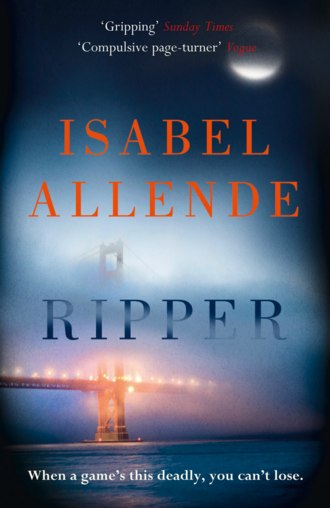
Полная версия
Ripper
Monday, 9
Alan Keller’s best-kept secret was that from a young age he had suffered from erectile dysfunction, a constant humiliation that made him avoid intimacy with women he found attractive, for fear of failing, and with prostitutes, because the experience left him depressed and angry. He and his psychoanalyst had spent years discussing the Oedipus complex until they were both thoroughly bored and moved on to other subjects. To compensate, he set himself the task of gaining an exhaustive knowledge of feminine sensuality, the things they should have taught at school if, as he liked to put it, the educational system dealt less with the reproduction of fruit flies and more with human sexuality. He learned ways of making love without having to rely on his erection, skillfully making up for what he lacked in potency. Later, by which time he had already developed a reputation as a ladies’ man, Viagra came along, and the problem ceased to torment him. He was on the point of turning fifty when Indiana blew into his life like a spring gale, ready to sweep away any trace of insecurity. He dated her for several weeks, never progressing beyond slow, lingering kisses, laying the groundwork with commendable patience until finally she tired of foreplay, unceremoniously grabbed his hand, and firmly took him to her bed—a four-poster with a preposterous silk canopy hung with little bells.
Indiana lived in an apartment above her father’s garage, in an area of Potrero Hill that had never become fashionable, close to the drugstore where, for twenty-nine years, Blake Jackson had earned his living. From here, she could cycle to work by a route that was almost completely level—there was only one hill in between—a major advantage in San Francisco, a city built on hills. At a brisk walking pace, the journey took her an hour; by bike it was just twenty minutes. Her apartment had two separate entrances, a spiral staircase that connected to Blake’s house and a door that opened directly onto the street via a steep flight of worn timber steps that were slippery in winter, and which every year her father suggested replacing. The apartment comprised two good-size rooms, a balcony, a half bath, and a tiny kitchenette set into a closet. It was more studio than apartment, and the family called it “the witch’s cave,” since aside from the bed, the bathroom, and the kitchen, every inch of space was taken up with art and aromatherapy equipment. The day she took Alan to her bed, they had the place to themselves; Amanda was at boarding school, and Blake was playing squash, as he did every Wednesday night. There was no danger of him coming home early; after a game, he and his buddies would always go out for sauerkraut and beer at some decrepit Bierkeller, where they carried on drinking until they were thrown out at dawn.
After five minutes in bed, Alan, who had not thought to bring a magic blue pill with him, was so intoxicated by the smell of essential oils that he could hardly think. He surrendered to the hands of this youthful, joyous woman, who performed a miracle, managing to get him aroused with no drugs, just a playful tenderness. Gone were his doubts and fears. Amazed, he followed her lead, and at the end of the journey he returned to earth deeply grateful. And Indiana, who had had many lovers and was in a position to judge, was also grateful: this was the first man interested in her pleasure rather than his own. From that moment, it was Indiana who sought out Alan, who called him up, taunting him with her desire and her humor, suggesting they meet up at the Fairmont, flattering and praising him.
Alan never detected any falseness or scheming on her part. Indiana was outspoken. She seemed utterly in love, happy and beguiled. It was easy to love her, yet he did not allow himself to be tied down, considering himself a wayfarer in this world, a traveler who did not take the time to look more deeply into anything except art, which alone seemed to offer permanence. He had had his share of conquests, but no serious lover until he happened on Indiana, the only woman ever to captivate him. He was convinced their relationship worked precisely because they kept it separate from the rest of their lives. Indiana made do with little, and this selflessness suited him, though he considered it somewhat suspect; he believed that all human relationships were a trade-off in which the cleverest came out on top. They had been together for four years and never mentioned the future, and though he had no intention of getting married, it offended Alan that Indiana had not raised the subject. He thought of himself as a good catch—especially for a woman of no means like her. There was still the problem of the difference in their ages, but Alan knew a lot of men in their fifties who dated women twenty years their junior. The only thing Indiana had insisted on from the beginning, from that first unforgettable night spent beneath the Indian silk canopy, was fidelity.
“You make me really happy, Indi,” he said in an uncharacteristic surge of honesty, mesmerized by what he had just experienced without recourse to pills. “I hope we can go on seeing each other.”
“As a couple?” she asked.
“As lovers.”
“Meaning we’d be exclusive. . . .”
“You mean monogamous?” He laughed.
Alan was a social animal; he enjoyed the company of interesting, sophisticated people, particularly of the women who naturally gravitated toward him because he knew how to make them feel special. He was the must-have guest at the parties that appeared in the society pages. He knew everyone, was up-to-date on all the latest gossip, the celebrities and their scandals. Although he deliberately strutted like a playboy to provoke desire among the women and jealousy among the men, he found that sexual relationships merely complicated his life, giving him less pleasure than good conversation or an entertaining show. Indiana Jackson had just proved there were exceptions.
“Let’s agree on one thing, Alan,” she proposed with unexpected seriousness. “Whatever this is, it has to be mutual—that way neither of us will feel betrayed. When I was married, I was very hurt by my husband’s affairs, by his lies—it’s something I don’t want to go through again.”
He readily agreed to monogamy—he had no intention of telling her that sleeping around was the least of his priorities. She agreed, but warned that if he did cheat on her, everything would be over between them.
“And you don’t need to worry about me,” she added. “When I’m in love, I have no problem being faithful.”
“Then I’ll have to make sure you stay in love with me.”
Lit by the faint glow of candles in the darkened bedroom, Indiana sat naked on the bed, her legs drawn up, her hair tousled, a work of art open to Alan’s expert gaze. He thought of The Rape of the Daughters of Leucippus in the Alte Pinakothek in Munich—the rounded breasts and pale nipples, the broad hips; the childlike dimples at the elbows and the knees—except that this woman had lips that were swollen with kisses and the unmistakable look of sated desire. Voluptuous was the word, he decided, surprised by the reaction of his own body, which had responded with a swiftness and a stiffness he could not remember ever experiencing.
A month later he began to spy on her. He could not believe that in the hedonistic atmosphere of San Francisco, this beautiful young woman would be faithful to him simply because she had given her word. He was so eaten up with jealousy that he hired a private detective, a man named Samuel Hamilton Jr., and instructed him to keep tabs on Indiana and a record of the men she met, including her patients at the Holistic Clinic. Hamilton was a short little man with the innocuous air of a vacuum cleaner salesman, but he had inherited the nose of a bloodhound from his father, a journalist who had solved a number of crimes in San Francisco back in the 1960s and was immortalized in the detective novels of William C. Gordon. The son was the spitting image of his father: short, red-haired, balding, keen-eyed. He was dogged and persistent in his fight against the criminal underworld but, overshadowed by his father’s legend, had never managed to truly develop his potential and so scraped by as best he could. Hamilton tailed Indiana for a month without discovering anything of interest, and for a while, Alan was reassured, but his calm was short-lived; soon he would call the detective again, the cycle of mistrust repeating itself with shameful regularity. Fortunately, Indiana knew nothing about these machinations, though she ran into Samuel Hamilton so often, and in such unexpected situations, that after a while they would say hello to one another.
Tuesday, 10
Bob Martín arrived at the Ashton residence in Pacific Heights at 8:55 a.m. that Tuesday morning. At thirty-six, he was young to be deputy chief of homicide in the Personal Crimes Division, but no one questioned his competence. Shortly after he graduated from high school—with great difficulty, having distinguished himself only on the sports field—he had spent a week partying with his buddies, forgetting that he was recently married and that his wife had just given birth to a baby girl. So his mother and grandmother forced him to wash dishes in one of the family restaurants, working shoulder to shoulder with the poorest Mexican immigrants—half of them illegals—to teach him what earning a living was like with no qualifications and no profession. Four months under the tyrannical regime of these twin matriarchs had been enough to shake him out of his idleness: he did two years of college before enrolling in the police academy. Bob Martín had been born to wear a uniform, to carry a gun, to wield authority. He learned to be disciplined; he was incorruptible, courageous, and stubborn, with a physique capable of intimidating any criminal and an absolute loyalty to the department and to his fellow officers.
As he drove to the crime scene, Bob punched the number of his trusty assistant Petra Horr into his cell phone and she gave him the lowdown on the victim. Richard Ashton was a psychiatrist, famous for two books he had written in the 1990s—Sexual Disorders in Pre-Adolescents and Treating the Juvenile Sociopath—and more recently for his participation at a conference where he demonstrated the advantages of hypnosis in the treatment of autistic children. A video of the conference had gone viral on the Internet, since it coincided with the news that the incidence of autism had risen at an alarming rate in recent years, and because Ashton’s stunt had been worthy of Svengali. To silence the skeptical whisperings from the audience and to prove how susceptible we are to hypnotism, he asked all the delegates to clasp their hands behind their heads. Moments later, though they tugged and twisted, two-thirds of those in the audience were unable to unclasp their hands until Ashton broke the hypnotic trance. Bob could not recall ever having heard of the man, still less his books. To his admirers Ashton was a leading figure in child and adolescent psychiatry, Petra Horr told Bob, and to his detractors he was a neo-Nazi who distorted facts to support his theories and used unlawful methods on underage, mentally challenged patients. The man frequently appeared on television and in the papers to discuss controversial subjects, Petra added, and sent him a link to a video that the deputy chief watched on his cell phone.
“Check it out,” said Petra. “It’s a video of Ashton’s third wife, Ayani.”
“Who?”
“Aw, come on, chief, don’t tell me you’ve never heard of Ayani! She’s one of the most famous supermodels in the world. She was born in Ethiopia. She’s the one who campaigned against female genital mutilation.”
On the screen of his smartphone, Bob recognized the woman with the high cheekbones, the languid eyes, the long neck, from the covers of various magazines. He let out a low, admiring whistle.
“Shame I didn’t get to meet her before!” he quipped.
“Well, now she’s a widow you can try your luck. You’re not a bad-looking guy—if you’d just shave off that drug-dealer mustache of yours, you might even be handsome.”
“Are you flirting with me, Ms. Horr?”
“Don’t sweat it, Chief, you’re not my type.”
The car drew up outside the Ashton residence, and the deputy chief ended the call. The house was hidden behind a tall, whitewashed wall above which he could see the tops of evergreen trees. From the outside, there was nothing ostentatious about the house, but the Pacific Heights address itself was a clear indication of its owners’ elevated social status. The high wrought-iron gates allowing access to cars were locked, but the door for pedestrians was wide open. Bob noticed a fire truck parked on the street and silently cursed the efficiency of the paramedics, who were frequently the first to arrive, blundering in to offer first aid without waiting for police backup. One of the officers led him through an overgrown garden to the house itself, an eyesore composed of concrete and glass cubes jumbled together as though dislodged by an earthquake.
In the garden, a number of police officers and first responders waited for orders, but the deputy chief had eyes only for the ethereal figure coming toward him, a dark-skinned nymph floating on a cloud of blue veils—the woman he had just seen on his cell phone. Ayani was almost as tall as he was, and everything about her was vertical. She had a complexion the color of cherrywood, a body lithe and supple as a bamboo stem, the undulating movements of a giraffe—three similes that immediately sprang to Bob’s mind, though he was a man little given to poetic flights of fancy. As he gazed at her, dumbfounded, she glided toward him in bare feet, wearing a silk shift the color of the sky reflected in a lake, and proffered a slim, elegant hand whose fingernails were unvarnished.
“Mrs. Ashton, I presume. . . . I’m Deputy Chief Bob Martín of the Personal Crimes Division.”
“You can call me Ayani, Deputy Chief,” the model said, sounding remarkably calm. “I called the police.”
“Tell me what happened, Ayani.”
“Richard didn’t come back to the house last night, so early this morning, I went to his study and brought him some coffee—”
“How early?”
“Between eight fifteen and eight twenty-five.”
“Why didn’t your husband come back to the house to sleep?”
“Richard would often spend the night reading or working in his study. He was a night owl, so I wasn’t worried if he didn’t come back to the house—sometimes I didn’t even notice, since we have separate bedrooms. Today was our anniversary—we’ve been married one year today—so I wanted to give him a surprise. That’s why I brought the coffee to him instead of Galang, who usually takes it.”
“Galang?”
“The butler—he’s Filipino, he lives on the property. We also have a cook and a maid who work part-time.”
“I’ll need to talk to all three. Please, carry on.”
“It was dark, the curtains were drawn. I turned on the light and . . . and then . . . I saw him. . . .” The beautiful woman’s voice quavered, and for a moment her perfect poise faltered, but she quickly composed herself and gestured for Bob to follow her.
The deputy chief told the patrol officers to call for backup and to set up a cordon around the house to keep away rubberneckers and the media, who, given the victim’s celebrity, would probably descend on the place very soon. He followed Ayani along one of the side paths to a building adjoining the main house, built in the same ultramodern style. She explained that her husband used the study as a consulting room for his private patients, since it had a separate entrance and there was no connecting door with the house.
“You’ll catch cold, Ayani,” said Bob. “Go and find something to wrap up warm, and put some shoes on—”
“I grew up with no shoes—I’m used to it.”
“Well, then, wait outside, please. There’s no need for you to have to see this again.”
“Thank you, Deputy Chief.”
Bob watched as she glided away across the garden and adjusted his pants, embarrassed by his ill-timed and deeply unprofessional reaction, which unfortunately he experienced quite often. He shook his head to dispel the images provoked by this African goddess and stepped into the annex, which was made up of two large rooms. In the first, the walls were lined with bookshelves and the windows screened by thick linen curtains; there was an armchair, a brown leather sofa, and an antique carved wood table. On top of the wall-to-wall cream carpet lay two well-worn Persian rugs whose quality was evident even to someone as inexperienced in interior design as Bob. Making a mental note of the coverlet and the pillow on the sofa—it must be here that the psychiatrist slept—he scratched his head; why would Ashton rather sleep here than in Ayani’s bed? Now if it were me . . . He pulled himself out of his daydream and returned his attention to his duties.
On the table rested a tray with a coffeepot and a clean cup; when Ayani set it down, she must not yet have seen her husband. Bob stepped into the other room, which was dominated by a large mahogany desk. He was relieved to see that the first responders had not actually set foot in the studio itself but had assessed the situation at a glance and withdrawn so as not to contaminate the crime scene. He had a few minutes before his forensics team arrived in force. He pulled on a pair of latex gloves and began a preliminary inspection.
Richard Ashton’s body lay supine on the floor next to the desk, bound and gagged with duct tape. He was dressed in gray pants and a pale blue shirt; his blue cashmere cardigan was unbuttoned, and he was barefoot. The wild, staring eyes bore a look of sheer terror, but there were no signs that the man had struggled: everything was neat and tidy except that some papers and books were damp. The ink from the documents had run a little, and Bob carefully moved them away from the spilled liquid. He studied the body, careful not to touch it; it had to be photographed and examined by Ingrid Dunn before he was allowed to lay a hand on it. He could see no visible wounds, no blood. He glanced around for a weapon, but since the cause of death was not yet known, it was a superficial glance.
Indiana’s peculiar ability to heal by her mere presence and to somatize the ills of others first manifested itself when she was a child, and she bore it like a cross until she finally found a way to put it to practical use. She studied the basics of anatomy, earned a license as a physiotherapist, and four years later opened her consulting rooms at the Holistic Clinic with the help of her father and her ex-husband, who subsidized her rent until she acquired a client base. According to her father, Indiana’s instinctive ability to distinguish the precise site and severity of a patient’s pain was like the echolocation of a bat. Using this sonar system, she made her diagnosis, decided on a course of treatment, and verified the results, but in healing, what served her best was her kindness and her common sense.
Her ability to somatize was capricious and manifested itself in different ways; sometimes it worked, sometimes it did not, but when it didn’t she resorted to intuition, which never failed her when it came to the health of others. Two or three sessions were enough for her to determine whether a patient was making progress, and if not, she referred them to colleagues at the Holistic Clinic who practiced acupuncture, homeopathy, herbal medicine, visualization, reflexology, hypnotherapy, music therapy, dance therapy, natural nutrition, yoga—and a host of other disciplines popular in California. Only rarely did she refer patients to a doctor; those who came here had usually exhausted all the possibilities of traditional medicine.
Indiana began by listening to new patients’ histories, thereby giving them the opportunity to unburden themselves, and sometimes this in itself was enough: an attentive ear can work miracles. Then she would proceed to the laying on of hands. She believed that people need to be touched; she had cured patients of loneliness, of grief, and of regret simply through massage. If an illness is not fatal, she would say, the body almost always heals itself. Her role was to give the body time, and facilitate the process; her therapy was not for those in a hurry. She employed a combination of approaches that she called holistic healing and which her father called witchcraft—a term that would have frightened off clients even in a city as easygoing as San Francisco. Indiana relieved symptoms, bargained with pain, tried to eliminate negative energy and imbue the patient with new strength. This was what she was currently doing with Gary Brunswick.
The man lay on his back on the massage table. A sheet was draped over him, half a dozen powerful magnets were strategically placed on his torso, his eyes were closed, and he was half dozing, lulled by the restful scent of vetiver and the almost inaudible murmur of lapping waves, soft breezes, and bird calls. Feeling the pressure of Indiana’s hands on his head, he realized with some sadness that the session was drawing to a close. Today more than ever he needed the healing power of this woman. The previous night had been exhausting. He had woken with the sort of hangover one might get from a bender, though in fact he never touched alcohol, and by the time he arrived in Indiana’s consulting room, he had a blinding headache; but her magic touch had managed to relieve it. For an hour, she had visualized a stream of sidereal dust falling from some distant point in the cosmos and passing through her fingers to envelop Gary.
Since the first visit the previous November, Indiana had used a variety of approaches with scant results, and she was beginning to lose heart. He insisted that the sessions with her relieved his pain, yet still she could visualize it with the certainty of an X ray. Believing as she did that wellness depended on a harmonious balance of body, mind, and spirit, and unable to detect anything physically wrong with Gary, she attributed his symptoms to a tormented mind and an imprisoned soul. Gary assured her that he’d had a happy childhood and a normal adolescence, so it was possible that this was related to some past life. Indiana was waiting for the opportunity to delicately broach the idea that he needed to cleanse his karma. She knew a Tibetan who was an expert on the subject.
Indiana realized from the start, before Gary even uttered a word at his first session, that he was a complicated guy. She could sense a metal band pressing in on his skull and a sack of stones on his back: the poor man was carrying around some terrible burden. Chronic migraine, she guessed, and he, astonished by what seemed like clairvoyance, explained that his headaches had grown so bad over the past year that they made it impossible for him to continue his work as a geologist. The profession required him to be in good health, he explained; he had to crawl through caves, climb mountains, and camp out under the stars. At twenty-nine years of age, he had a pleasant face and a puny body, his hair cropped short to disguise his premature baldness and his gray eyes framed by thick black glasses that made him seem insipid. He came to Treatment Room 8 every Tuesday, always arriving punctually, and if he was particularly in need, he would request a second session later in the week.
He always brought Indiana little gifts, flowers or books or poetry. He was convinced that women preferred poetry that rhymed, particularly on the subject of nature—birds, clouds, rivers. This had in fact been true of Indiana before she met Alan, who was ruthless in matters of art and literature. Her lover had introduced her to the Japanese tradition of haiku, particularly the modern variant gendai haiku, though in secret she still enjoyed sentimental verse.
Gary always wore jeans, boots with thick rubber soles, and a metal-studded leather jacket, an outfit that contrasted starkly with his rabbitlike vulnerability. As with all her clients, Indiana had tried to get to know him well so that she could discover the source of his anxiety, but the man was like a blank page. She knew almost nothing about him, and what little she managed to find out, she forgot as soon as he left.
At the end of the session that Tuesday, Indiana handed him a vial of oil of geranium to help him remember his dreams.








